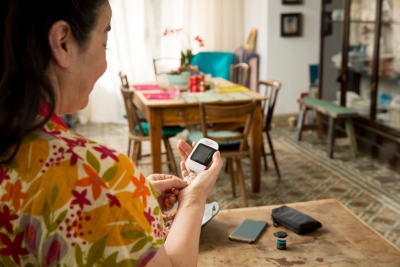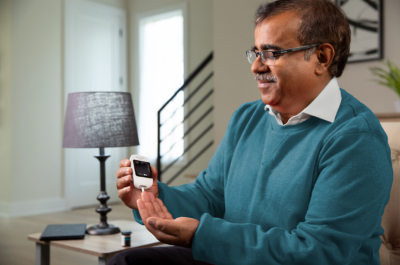Stay healthy during COVID-19
Learn more about the safety measures by International Diabetes Federation (IDF) and World Health Organisation (WHO) against COVID-19 for people living with diabetes.
Read MoreLiving in Range
Feeling your best—life in your target range When you find your mind wandering—thinking about the future—what do you see? Whether you dream about taking photos somewhere amazing or starting a family, or you'd simply like to have more energy or sleep through the night, keeping your blood glucose in line can help you achieve it. Sometimes it can seem like diabetes is all about the numbers. But your efforts to stay within your target ranges for blood glucose before and after meals, as well as meeting your HbA1c goal, are really about feeling your best today and for years to come ...
Read MoreTreating Low BG
Low blood glucose: Know the signs and steps to take You may recognize the feeling—feeling hungry, dizzy, sweaty or just a little bit "off." These signs of hypoglycaemia, or low blood glucose, mean it's time to take action. What causes low blood glucose? For most people, low blood glucose refers to anything below 4.0 mmol/L , although your number may be different.1 Low blood glucose can be caused by taking too much medication, not having enough to eat or exercising. In fact, hypoglycaemia can occur up to 12 hours after you've been...
Read MoreHow to Talk to Your Doctor
How to Talk to Your Doctor Whether you’ve been living with diabetes for years or you’re newly diagnosed, communicating with your healthcare team is one of the best things you can do. If you’re nervous about opening up to your doctor or pharmacist, there are some good reasons to conquer these fears. Less communication leads to measurable increases in your stress, anxiety, and possible depression. It also leads, inevitably, to less frequent and less successful diabetes management.1 Since communicating with your healthcare providers is proven to be good for your health, here are some...
Read MoreTips for Making Testing Easier
Whether you check your blood glucose level once a week, once a day, or 6 times a day, learning how to make testing easy and less painful may inspire you to test more often. For people with diabetes, the knowledge that you gain from testing is the key to staying in control of your health. It helps you make informed decisions about medicine, food, and exercise. It helps you cope with the day-to-day demands of living with diabetes, you’ll feel better each day, and you’ll lower your risk for future diabetes complications.1 Here are some tips for getting the best results possible. A guide...
Read MoreHow to Travel with Diabetes
How to Travel with Diabetes Having diabetes adds complexity to planning a well-deserved holiday. Changing your schedule, time zones, increased activity, eating on-the-go or new foods can affect your health. You’ll want to be ready for anything. But don’t stress! We’re here to make it easy, with a review of everything you’ll need for hitting the roads, skies, seas, or rails. Make a doctor’s appointment If your trip is going to last longer than a day or two, make an appointment with your doctor or pharmacist a few weeks before you leave. Let them know your travel plans...
Read MoreManaging Sick Days
Feeling fine? It's the perfect day to create a sick day plan. When you're feeling ill, you'd like nothing more than to lie in bed with a good book or movie. Yet that's when you need to focus even more on diabetes self-care. The key to sick days with diabetes is doing all of the thinking ahead of time. That way, when you don't feel like concentrating, you can simply follow the plan. What to include in your plan Involve your diabetes care healthcare team in developing your sick day plan—ask them when you should call for help, how often you should...
Read MoreEating Healthy with Diabetes
You don’t have to sacrifice your target blood sugar levels to enjoy some of your favorite foods. Here’s how to eat healthy with #diabetes, whether you’re cooking at home, or eating in a restaurant. Carbohydrates and your blood sugar Carbohydrates are sugars. They break down in the body creating glucose, a main source of energy. Counting the carbs you eat at every meal and pairing them with the correct dosage of insulin can keep your blood sugar level closer to normal range.1 It also allows you to eat a wider variety of foods. In fact, your diet can accommodate any food in...
Read MorePractice #GlucoVigilance during these times to be in range
Background: The current times are beyond anything we have ever experienced. During these unprecedented times, we all should put our health on priority and exercise caution. Even more so, if one has diabetes. People with uncontrolled diabetes are at a higher risk, due to lower immune response.1,2 WHO has raised an advisory and has suggested that patients with chronic ailments like cardiovascular diseases, diabetes, hypertension, chronic respiratory diseases and cancer are more prone to severe illnesses as compared to others during these times.3 Hence, it is extremely important for...
Read MorePages
Living in Range
Feeling your best—life in your target range When you find your mind wandering—thinking about the future—what do you see? Whether you dream about taking photos somewhere amazing or starting a family, or you'd simply like to have more energy or sleep through the night, keeping your blood glucose in line can help you achieve it. Sometimes it can seem like diabetes is all about the numbers. But your efforts to stay within your target ranges for blood glucose before and after meals, as well as meeting your HbA1c goal, are really about feeling your best today and for years to come ...
Read MoreTreating Low BG
Low blood glucose: Know the signs and steps to take You may recognize the feeling—feeling hungry, dizzy, sweaty or just a little bit "off." These signs of hypoglycaemia, or low blood glucose, mean it's time to take action. What causes low blood glucose? For most people, low blood glucose refers to anything below 4.0 mmol/L , although your number may be different.1 Low blood glucose can be caused by taking too much medication, not having enough to eat or exercising. In fact, hypoglycaemia can occur up to 12 hours after you've been...
Read MoreHow to Talk to Your Doctor
How to Talk to Your Doctor Whether you’ve been living with diabetes for years or you’re newly diagnosed, communicating with your healthcare team is one of the best things you can do. If you’re nervous about opening up to your doctor or pharmacist, there are some good reasons to conquer these fears. Less communication leads to measurable increases in your stress, anxiety, and possible depression. It also leads, inevitably, to less frequent and less successful diabetes management.1 Since communicating with your healthcare providers is proven to be good for your health, here are some...
Read MoreTips for Making Testing Easier
Whether you check your blood glucose level once a week, once a day, or 6 times a day, learning how to make testing easy and less painful may inspire you to test more often. For people with diabetes, the knowledge that you gain from testing is the key to staying in control of your health. It helps you make informed decisions about medicine, food, and exercise. It helps you cope with the day-to-day demands of living with diabetes, you’ll feel better each day, and you’ll lower your risk for future diabetes complications.1 Here are some tips for getting the best results possible. A guide...
Read MoreHow to Travel with Diabetes
How to Travel with Diabetes Having diabetes adds complexity to planning a well-deserved holiday. Changing your schedule, time zones, increased activity, eating on-the-go or new foods can affect your health. You’ll want to be ready for anything. But don’t stress! We’re here to make it easy, with a review of everything you’ll need for hitting the roads, skies, seas, or rails. Make a doctor’s appointment If your trip is going to last longer than a day or two, make an appointment with your doctor or pharmacist a few weeks before you leave. Let them know your travel plans...
Read MoreManaging Sick Days
Feeling fine? It's the perfect day to create a sick day plan. When you're feeling ill, you'd like nothing more than to lie in bed with a good book or movie. Yet that's when you need to focus even more on diabetes self-care. The key to sick days with diabetes is doing all of the thinking ahead of time. That way, when you don't feel like concentrating, you can simply follow the plan. What to include in your plan Involve your diabetes care healthcare team in developing your sick day plan—ask them when you should call for help, how often you should...
Read MoreEating Healthy with Diabetes
You don’t have to sacrifice your target blood sugar levels to enjoy some of your favorite foods. Here’s how to eat healthy with #diabetes, whether you’re cooking at home, or eating in a restaurant. Carbohydrates and your blood sugar Carbohydrates are sugars. They break down in the body creating glucose, a main source of energy. Counting the carbs you eat at every meal and pairing them with the correct dosage of insulin can keep your blood sugar level closer to normal range.1 It also allows you to eat a wider variety of foods. In fact, your diet can accommodate any food in...
Read MorePractice #GlucoVigilance during these times to be in range
Background: The current times are beyond anything we have ever experienced. During these unprecedented times, we all should put our health on priority and exercise caution. Even more so, if one has diabetes. People with uncontrolled diabetes are at a higher risk, due to lower immune response.1,2 WHO has raised an advisory and has suggested that patients with chronic ailments like cardiovascular diseases, diabetes, hypertension, chronic respiratory diseases and cancer are more prone to severe illnesses as compared to others during these times.3 Hence, it is extremely important for...
Read More








